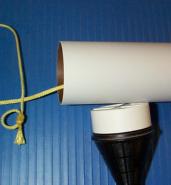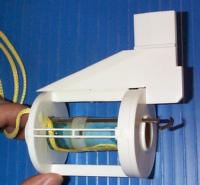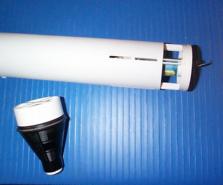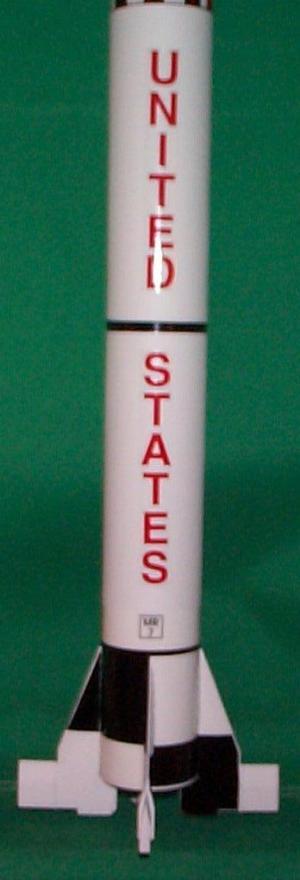 Brief:
Brief:
This is a single stage high quality replica of Gus Grissom's Liberty Bell 7 approx 1/50th scale designed for B & C engines. This kit is unique from every other Estes kit I have bought or built in a number of ways... The package says skill level 2, but it compares to other level 3 kits from Estes.
Construction:
This kit recently went on sale, supposedly a reissue of an earlier Estes kit. I obtained it from HobbyLinc for ~$17. The kit came in the typical Estes half cardboard package with plastic bag. All components were present except for an engine block ring.
The body tube was an Estes white body tube but it is closest in diameter to (but not quite) BT-70. It came in two pieces that required a tube coupler. All molded plastic parts were of the HIGHEST quality, which is definitely not the norm for Estes. They were smoother, had no flash, and fit together PERFECTLY, including knife edges of the fins. The capsule and escape tower have a LOT of detail, and decals include a crack they painted on the capsule to simulate the liberty bell. The four fins mount through-the-wall to a plastic engine mount that is also unique in my experience to Estes. Four slotted bars connect the forward and aft plastic centering rings. These slotted bars line up with pre-cut slots in the body tube, and the fins glue to the slotted bars without extending all the way to the 18mm engine tube. All of the plastic parts fit together with such precision that the use of brushed liquid (rather than tube) plastic cement is called for to maintain assembly quality. The parachutes are the standard Estes 12 and 18" plastic chutes and the instructions call for the standard folded paper shock cord mount. My only material deviation from the kit was the use of Pratt braided Kevlar® for the shock cord.
Since the quality of the materials is so high, there are a few deviations from the assembly order to match that high quality in final appearance. Estes has done a wonderful job of supplying materials for a great model, but if you follow their instructions, you will end up with a cheesy looking model anyway. The rev date on the instructions are 10-00 and Estes must be complying with political correctness by providing MINIMUM written instructions. There are no notes or warnings about modeling technique for any of the steps. Everything is visual. With very few exceptions, the entire instruction sheet is pictures; with English words only as titles of components. That is still OK if you are an experienced modeler, but for example the only place the kit dimensions and recommended engines are listed is on the package cover. Estes used to put them on the launch instruction page. The kit dimensions as listed on the box are wrong anyway, saying the models' length is 23.5 inch and dia. is 1.6 inch (major goof). I also have a major problem with the assembly order. Because the bottom roll pattern decal is a wrap around, the instructions have you put it on before you install the fins, which makes sense. However, IF you want the quality of the rocket body to match the quality of the fins and capsule module, you need to assemble the two body tube halves, fill and sand the grooves (white Estes tube, remember?), and paint; before installing the motor mount and decal. The kit instructions would have had the finished model rely on the stock white body tube for the body color complete with those ugly spiral grooves! So,... because you are putting the two body tubes together, you have to also install the upper launch lug prior to joining the body tubes. This is because the launch lugs are plastic and glue to a plastic backing plate through a pre-cut slot. The lower launch lug glues to the forward centering ring and can't be put on until after the engine mount is installed.



Regarding the engine mount, there is a gotcha that caught me. The alignment and fit of the engine mount components are critical to the fit of the fins and the decal. I made my own engine block out of an expended engine casing, and it had a little bit extending out past the end of the engine tube. The forward centering ring which glues to the engine tube is therefore about 1/64 inch too far forward. Since the location of the forward centering ring dictates where the slots will be that the fins mount to, the plastic slots ended up about 1/64 inch too far forward. This caused the fins to not fit over the back of the body tube. I had to dremel off a little bit of the fin material to regain fit. This also slightly threw off my decal alignment.
I epoxied my small Pratt braided Kevlar® to the engine mount on the opposite side of the engine hook, and led it through the small opening in the forward centering ring for the engine hook. I then locked everything down with epoxy, and glued the engine mount in the body tube with epoxy as better security than tube plastic cement on plastic/cardboard joints (I have noted how many times my Skywinder has come apart). Make sure you don't get any glue in the pre-cut fin slots, as the fit of the fins is precise.
The tower struts were the only plastic pieces that didn't fit together perfectly, so I worked my way up from the bottom gluing one joint at a time, and letting it set before I did the next one.
 Finishing:
Finishing:
The decals fit really well, and I was a little concerned that the bottom roll pattern decal sheet had white in the white areas rather than clear like the top pattern. The white didn't match my Krylon flat white on the body tube. But, once applied to the tube, it blended in and is hardly noticeable. Because of my gaffe on the forward centering ring, the bottom decal didn't quite reach flush to the bottom of the tube. A little touch up with black brushed enamel blended right in and covered up minor gaps of the black decals. The instructions show masking and painting the capsule flat black after you have glued on the tower. That would be dumb. I painted the assembled capsule flat black masking off the part of the capsule that glued to the tower assembly, and the base that slides into the body tube. I then spray painted the red tower before gluing to the capsule. Then, I brush painted the small portion of the capsule that is black underneath and behind the tower struts.
Construction Rating: 4 out of 5
Flight:
Recommended motors on the cover and in very fine print on the flight prep instruction page are B6-4, C6-3, and C6-5. THIS IS WRONG! These are based some old Estes Redstone kit made out of BT-60 tube that I presume weighed 3.2 oz like the package cover says and not 4.5 oz. This kit is bigger and heavier, as I pointed out already.
I discovered that the body tube diameter is the same as the Estes Skill level 4 Space Shuttle Main Fuel Tank. It is slightly smaller than BT-70, but Estes has apparently never sold the body tube by itself or assigned a BT-xx number to it.
Anyway, the old Estes catalog listed max lift off weights for C6 engines as 4.0 oz, and C5 engines as 8.0 oz which is due to higher initial thrust of the C5's. Therefore, I launched this with some of my remaining C5-3's. The motor fit kind of tight through the plastic lip of the engine mount. I barely got the hook back down over the engine. The wind was a slight waft, and the rocket flew straight up at a medium speed to about 250 ft by eyeball. Ejection occurred at apogee just as the rocket started to lean over. My RockSim model predicts 350 feet on a C5-3, but I think there is quite a bit more wind resistance for real than the simulation model making this a C engine rocket only in little or no wind only.
Recovery:
I used quite a bit of biodegradable cellulose wadding instead of the Estes wadding. On one flight, it did channel some in this relatively wide tube, and I had some slight melt damage to the bottom chute with some wadding remaining in the tube even though it was a good healthy ejection. I used the provided 18 inch chute for the main body which was just right. I tied a two foot section of elastic shock cord to the braided Kevlar® that I put inside the rocket. Descent rate for the booster was just right. It landed about 10 seconds before the capsule, which was on a 12 inch chute.
The instructions for attaching the chute to the capsule worked fine. A single 20 inch strand of shroud line is tied around what would be the parachute can on the real capsule and the other end tied to the bottom of the capsule. The parachute shrouds are tied to this single strand about 4.5 inches from the front, so the parachute is packed into the body tube with a single strand of cord being strung through the joint between the body and capsule when the capsule is placed on the body. A similar technique is used on the Estes Saturn V for recovery of the top piece to protect the fragile escape tower by bringing down the top part in a nearly horizontal configuration. In this case, tying the chute shrouds 4.5 inches from the front brings the capsule down at about a 20 degree angle from vertical, which is just right. It almost looks like the real thing. The engine came out of the mount easier than it went in, but I always remove my engines while still hot to ensure they don't get stuck later.
Flight Rating: 5 out of 5
Summary:
PRO: quality and detail of the plastic components.
CON: instructions; especially concerning finishing issues, are out of order if you want a great looking kit!
The overall 5 is based on if you follow my recommendations to make this a very high quality model. If you follow Estes' instructions to the letter, this kit would be rated 3. One other Con is the self-adhesive decals tend to bubble over time. I put on at least three coats of clear kote and that still may not be enough.
Overall Rating: 5 out of 5

 Brief:
Brief:


 Finishing:
Finishing:


